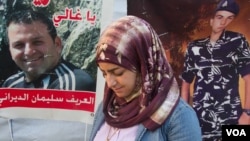A call had come the previous night from Jihadists holding captive the brother of Layali Ahmad Dirany, and this time it was good news.
Standing in the small encampment in the heart of Beirut's downtown district that has been her home for half a year, she recounted the latest development in a painful saga with regional implications.
“It was via a voice message saying that he was fine, and that Jabhat al-Nusra didn’t hurt him,” she told VOA.
There is no telling what the next call will say about the fate of Suleiman Dirany, one of 25 Lebanese policemen and soldiers being held on the border with Syria by the Islamic State and Jabhat al-Nusra, also known as Nusra Front, after their capture last August.
“The waiting itself is so hard, it is so hard to wait for someone when you can't hear his voice or even see him,” Layali said. “It’s like waiting for something unknown, and the unknown is frightening so we are exhausted.”
Hostages
The servicemen were among more than 30 people taken hostage as Lebanese troops sought to reclaim the town of Arsal after militants briefly overran it last year as part of efforts to expand beyond Syria and Iraq. Since then, eight servicemen have been released and four executed.
In a bid to pressure the government into helping their loved ones, Layali and her sister were one of 13 families that set up camp on the doorstep of the government nearly half a year ago. They have been a near-permanent presence, leaving the site only briefly when their tents were destroyed by storms in January.
Hussein Youssef is the father of soldier Mohammad Youssef and spokesman for the group. He explained the decision to set up the encampment, which was set up after the families had initially blocked roads as part of their protests.
“Our presence here, next to the Lebanese government, is our choice to put pressure on them as we are the relatives of the kidnapped and we have the right to decide their destiny, their life and what's happening to them,” Youssef said.
Youssef told VOA he thought recent months had seen the government step up its efforts to bring the servicemen home. Reports on how the negotiations are going often vary and, occasionally, even contradict one another.
Prompted by previous leaks that Prime Minister Tammam Salaam has criticized as damaging to negotiations, the government has recently been tight-lipped about the crisis.
Recent weeks have included claims that Qatar, which suspended its involvement in the talks at the end of last year, may reintroduce mediators. Earlier this month, the families had to counter media claims that talks had stalled entirely.
These were prompted by a TV station broadcasting a message recorded by one of the captive servicemen, claiming negotiations were “nonexistent” and calling for a quick resolution to the situation.
Feel pressure, manipulation
Youssef stated the families will “sometimes pressure, sometimes help” the state. He is all too aware of the danger of being manipulated by the two groups of hostage-takers, who have allowed some of the families to visit their sons, and whose reported demands have previously included the release of Islamist prisoners from Lebanon’s Roumieh prison.
“We think these recordings are to help improve the negotiations for Jabhat al-Nusra or the Islamic State,” he said, adding that threats nonetheless had to be taken seriously.
According to some, these attempts at manipulation do not just stop at the families.
Imad Salamey, associate professor of political science and international affairs at the Lebanese American University, claims the Islamists are seeking to exploit political divisions and further tensions between Sunni and Shi'ite in order to destabilize the country.
“Both ISIS [Islamic State] and Nusra Front in various ways are trying to use the issue of the hostages to instigate this Sunni-Shia struggle, and trying to claim that the Lebanese government is negotiating in bad faith while advocating that their causes are the cause of all Sunnis," Salamey said.
In this small community, such divisions have become meaningless.
Layali is a Shi'ite Muslim who, unlike most of the others, continues to go to work as an engineer. She pointed to the presence of Shi'ite and Sunni Muslims, as well as Christians and Druze, in the surrounding tents.
“Sunni and Shia have been brought together and we are all one family here. We share everything and it makes the burden a little smaller," she said.
The phone calls, headlines and announcements are likely to continue, but for now, all those who are united in fear for their loved ones can do is hope.
Youssef, for one, is not going to give up.
“I, personally, have great hope and faith that I will see my son and hug him,” he said. “And he will hug his son and his wife and return to his previous life as it was before this problem.”







